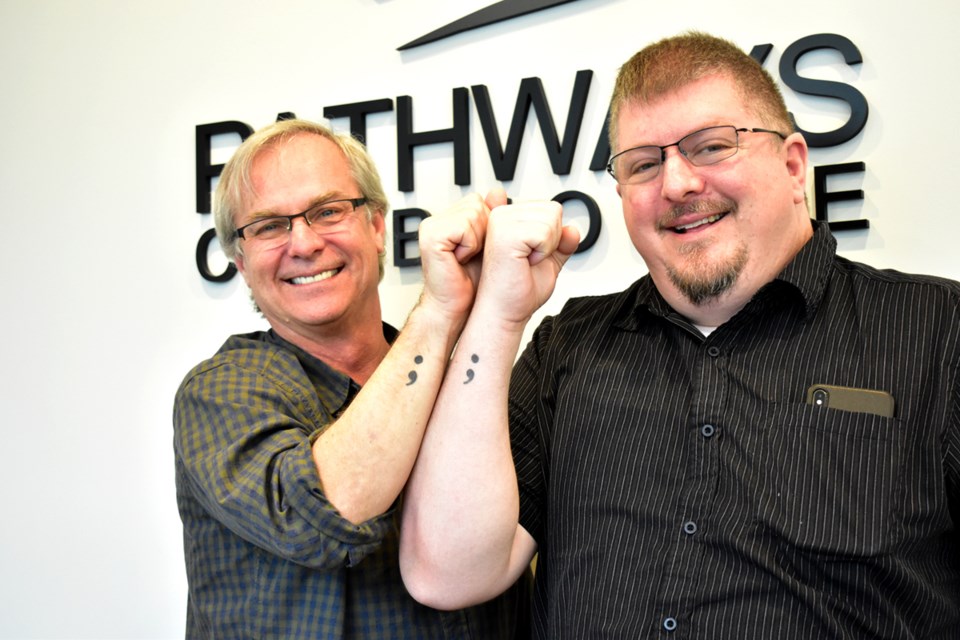Dave MacDonald and Mike Tibbles are peers, close friends and both in recovery from mental illness. And they both have semicolons tattooed on their forearms for the same reason — they have chosen to continue living.
The semicolon is a pause to take a quick inhale, unlike the final exhale of the period.
“Just because I’m ill, it’s not the end of my story,” MacDonald said.
“(The semicolon) means we could have chosen to end our lives, but we decided to continue,” Tibbles added.
Both men have had suicide attempts in the past, but they have survived and the semicolons symbolize their choice to continue living.
MacDonald and Tibbles meet daily at Pathways where MacDonald is the executive director.
MacDonald has been managing the clubhouse for 17 years, but recently has opened up about his own depression and anxiety.
It’s important to reduce stigma around mental illness, MacDonald said, especially as the director of an organization serving people with mental illness.
Tibbles has schizoaffective disorder, which is schizophrenia combined with depression. He will tell his story next week at Pathways’ 13th annual gala, where the non-profit hopes to raise money toward youth programs — last year’s gala raised $100,000.
For Tibbles, the connections he’s formed at Pathways, that has been operating in Richmond for 35 years, have kept him on his path to recovery.
“The biggest thing that has helped me is the relationships,” he said.
At Pathways Clubhouse, located at Storeys on Granville Avenue, a stone’s throw from city hall, there is no organizational hierarchy, explained MacDonald, and there is no distinction between “clients” and “staff.”
In fact, the word “client” makes MacDonald cringe, unlike the word “member” which, he feels, gives people a sense of belonging and collegiality.
“When you walk through the door, if you don’t know who is staff and who is a member — that’s a good thing,” he said.
There are regular meetings that include staff and members deciding together how the clubhouse operates. Members are also involved in hiring new staff and in their training.
This is deliberate and follows the model of Clubhouse International, MacDonald said, an organization started in the 1940s in New York by people who were leaving psychiatric facilities and wanted to support each other.
So often people with mental illness lose control over their personal choices in regimented clinical-institutional settings, said MacDonald.
“A lot of decisions are made for you,” he added.
While the health-care system is integral to recovery from mental illness, Pathways provides another important component — pscyho-social rehabilitation.
Activities such as tai chi or Spanish classes help individuals connect and be active, but when members also participate in running the clubhouse, they can re-integrate into the work force through the clubhouse’s supported employment program.
Pathways provides housing for people with mental illness including five units at Storeys, 24 units on Alexandra Road, with a third building in the works.
Pathways is largely funded by the provincial government, but their youth programs are not funded, which is why the fundraising at this year’s gala is focused on youth. Gilmore United Church has already committed $20,000 per year for three years for youth.
At Pathways, they call their gala a “friendraiser,” MacDonald said, because they want to celebrate the work they do and show appreciation to their supporters.
For information about Pathways, go to pathwaysclubhouse.com.
The Semicolon
The Semicolon is a symbol of hope for those who struggle with depression and suicidal thoughts. It says the sentence isn’t over, as with a period, rather it’s continuing after a pause. Pathways’ Dave MacDonald said the semicolon serves as a good conversation starter about mental health. Richmondites needing help with mental health issues can call 604-204-1111.



